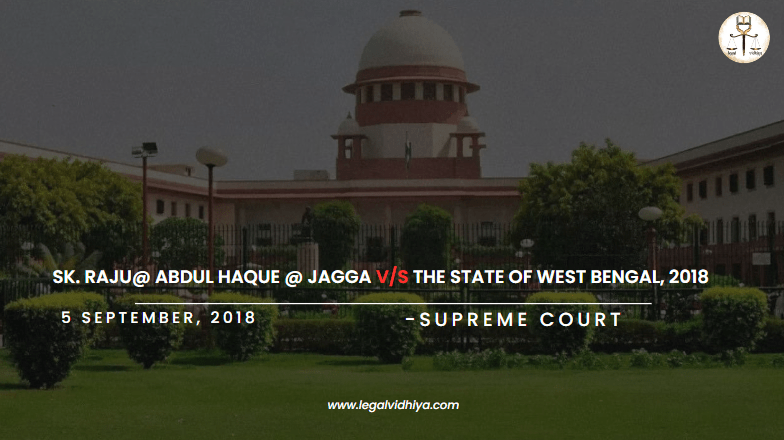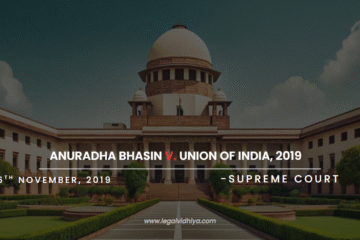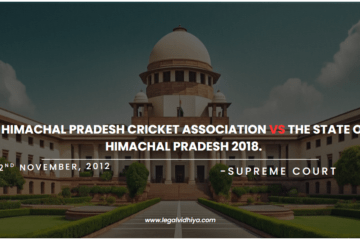
| CITATION | 2018 (9) SCC 708 |
| DATE OF JUDGEMENT | 5 September, 2018 |
| COURT | Supreme Court of India |
| APPELLANT | Sk Raju @ Abdul Haque @ Jagga |
| RESPONDENT | State of West Bengal |
| BENCH | J. Indira Banerjee, J. Dhananjaya Y Chandrachud, J. Dipak Misra |
| JURISDICTION | Criminal Appellate Jurisdiction |
INTRODUCTION
Sk Raju @ Abdul Haque @ Jagga Vs The state of West Bengal, 2018 is an important case held in the Hon’ble Supreme court of India. It cleared the major ambiguity between section 42 and section 43 of NDPS Act. It also respected the importance of section 50 of the said act being a mandatory strict compliance. It also provided the concept that the person who can conduct the search should be an independent officer and not a member of that raiding team. It basically rechecked the decision which was passed by the Division bench of Calcutta High court. It also cleared the concept of “what can be considered to be a public place?” The case involves appellant Sk Raju @ Abdul Haque @ Jagga and respondent state . This was a remarkable case in the year of 2018.
FACTS OF THE CASE
On the date of 15th November 2011, Sub-inspector Prasanta Das, in-charge of Narcotic cell (prosecution witness-2) received information that a drug-dealer would be in the nearby area of Tiljala Falguni Club, picnic garden road, near Tiljala police station in order of narcotic drugs supply around afternoon.
The Prosecution witness-2 took consent from his superior officer to organise a raid in that particular area and therefore, his permission was granted on the same day and a raiding team including prosecution witness-2 arrived at the aforesaid address by 12:50 in the noon.
By 1:40 pm, the team found the appellant moving in the picnic garden road and so, they sharply restrained him and detained him in front of the Falguni club. As usual, the appellant was provided with ample reasons for the detention and the raiding team revealed their identities to him. The appellant also did the same. The appellant was also apprised about his legal right whether to be searched by a magistrate or a gazetted officer.
The appellant chose to be searched by a gazetted officer (Prosecution witness-4). The gazetted officer came and again provided him with a second option whether he wants to be searched by a nearest magistrate or a gazetted officer. The appellant chose a gazetted officer again.
The gazetted officer asked the appellant whether he wanted to search PW-2 first or PW-2 will search him first. To which, the appellant replied that he’ll first search PW-2. Through search, no narcotic substance was found from PW-2. Now, PW-2 searched the appellant and they found deep blackish-brown rectangular sheets wrapped in a black polythene in a jute bag which was carried by the appellant in his right hand.
The sheets were tested by PW-2 and the aforesaid substance was found to be “charas” which was around 1.5 kgs and an amount of 2,400 INR was also recovered from the appellant.
The case went to Calcutta High court who upheld the conviction of appellant by Additional sessions Judge who held the appellant punishable under section 20(b)(ii)(c) of NDPS Act, 1985. Providing 14 years of rigorous imprisonment along with a fine of 1,40,000 INR. Aggrieved by the decision, the appellant filed a suit in the Hon’ble Supreme Court of India.
ISSUE RAISED
- Whether the decision of ASJ and Calcutta High court is valid in convicting the appellant?
- Whether the essential criteria were fulfilled u/s 42 and 50 of NDPS Act?
ARGUMENTS RAISED BY THE APPELLANT
- The learned counsel for appellant has argued that section 42 of NDPS Act wasn’t complied properly by PW-2 as he was aware of the requirement of section 42 being a mandatory element in the cross-examination and moreover, through a mere information, the superior officer didn’t diarise and granted consent to PW-2 to organise raid for appellant. Therefore, due to non-compliance with section 42 of NDPS Act, the trial should thereby stand vitiated.
- Cases like Abdul Rashid Ibrahim Mansuri v State of Gujarat, Directorate of Revenue v Mohammed Nisar Holia, State of Rajasthan v Jagraj Singh were provided by the learned counsel for appellant to strengthen their arguments.
- It was also contended that there was non compliance with section 50 of NDPS Act too as not only the appellant’s bag was searched but also the search of the person resulted in the recovery of 2400 INR. Moreover, the appellant was merely asked whether to be searched by nearest magistrate or gazetted officer and was not apprised of his legal right. Therefore, there was breach of adherence and so there is non-compliance with section 50 of NDPS Act.
- The counsel referred to the cases of Myla Venkateswarlu v State of Andhra Pradesh, State of Rajasthan v Parmanand, Namdi Francis Nwazor v Union of India in order to support his aforesaid argument.
ARGUMENTS RAISED BY THE RESPONDENT
- The learned counsel for respondent has supported in favour of the High court’s judgement and the legal validity of conviction. It was argued that the search took place in a public place therefore, due to presence of public place, section 43 of NDPS Act can be held applicable instead of section 42 in the current case.
- It was also argued that section 50 isn’t applicable when the search involves search of a bag or of a person.
- The counsel also differentiated between sections 42 and 43 stating that in the former, providing ample reason to belief can lead to conduct of search and seizure but the latter doesn’t involve provision as such.
- The learned counsel also took the case of Narayanaswamy Ravishankar v Assistant Director, Directorate of Revenue Intelligence, where the court held that the search and seizure took place in an airport which is a public place. Therefore, section 43 was held applicable instead of section 42.
- Relying on this case, the counsel contended that the appellant was searched in a public place i.e. the picnic garden road and not in any building, conveyance or an enclosed place as mentioned under section 42 of NDPS Act. Therefore, the cases relied by the learned appellant counsel can’t be held applicable to the present case.
- The counsel took the case of Mansuri which was relied upon by the learned appellant counsel and stated that the auto-rickshaw driver’s search was conducted under section 43 and not under section 42 of NDPS Act.
OBSERVATIONS BY THE SUPREME COURT
The Hon’ble Supreme court rejected the argument made by the learned respondent counsel in the case of Holia where the counsel stated that the hotel is a public place and will come under section 43 but the tablets were recovered from the hotel room where respondent was residing. The hotel can be a public place but the room can’t be. Therefore, if section 43 has to be taken as an exception to section 42 then it should be followed strictly. The place can be public but if the search isn’t public then only it’ll attract section 42.
The mandate of section 50 has already been seen in the case of Vijaysinh C. Jadeja Vs State of Gujarat where it was held that section 50(1) is a mandatorily strict compliance to be followed by an empowered officer but however, section 50 is only applicable for a search of a person.
The Hon’ble court also mentioned the case of Dilip Vs State of Madhya Pradesh where it was held that if a bag carried by a suspect is searched without any search of person, then it willn’t attract section 50 but if both of them are searched then section 50 can be applied. Moreover, in this case, the empowered officer apprised the respondent whether to be searched by nearest magistrate or gazetted officer or the superintendent who was a part of the raiding team. The court also in this case held that the superintendent can’t conduct a search under section 50 since he was a part of the raiding team and wasn’t an independent officer. Therefore, the search conducted by the superintendent stood vitiated.
JUDGEMENT BY THE SUPREME COURT
In the present case, the appellant was apprised of his legal right whether to be searched by a nearest magistrate or gazetted officer through first option. He was also provided freedom to choose one of them. The appellant was then provided with a second option with the help of a gazetted officer but still the appellant chose to be searched by a gazetted officer. The appellant was also asked whether he wants to search PW-2 first or PW-2 will first search him. To which he replied that he wants to search first. Later, PW-2 searched him and found sheets which were charas recognised through the help of a test kit. Therefore, the search over here isn’t just a search of a bag but also the search of the person under section 50 of NDPS Act. PW-2 has complied strictly with the criteria under section 50(1).
The options provided by gazetted officer (PW-4) and PW-2 were clear and unambiguous in nature. The option given to appellant of searching PW-2 willn’t vitiate the search which will later be conducted by PW-2 on appellant.
A voluntary communication and consent was also taken from the appellant to conduct the search in front of the gazetted officer. Therefore, the whole procedure was strictly complied with the essentials of section 50(1) of NDPS Act as mentioned in the case of Vijaysinh C. Jadeja Vs state of Gujarat.
Therefore, due to the valid applicability of section 50 in the present case, the appeal was dismissed accordingly.
CONCLUSION
To conclude, the Supreme Court in this case upheld the decision of ASJ and of the Calcutta high court. The trial wasn’t vitiated since it fulfilled the requirements properly under section 50(1) of NDPS Act as mentioned in the Vijaysinh Case. There was no uncertainty and arbitrariness found during the conduct of search by PW-2 and PW-4 on the appellant. Lastly, the search was done in a public place. Therefore, it attracted section-43 and not section-42 of NDPS Act.
REFERENCE
https://indiankanoon.org/doc/84174937
This case analysis is written by Arpeeta Dash, a 3rd semester student of Symbiosis Law School, Nagpur; an intern at Legal Vidhiya.
Disclaimer: The materials provided herein are intended solely for informational purposes. Accessing or using the site or the materials does not establish an attorney-client relationship. The information presented on this site is not to be construed as legal or professional advice, and it should not be relied upon for such purposes or used as a substitute for advice from a licensed attorney in your state. Additionally, the viewpoint presented by the author is of a personal nature.




0 Comments